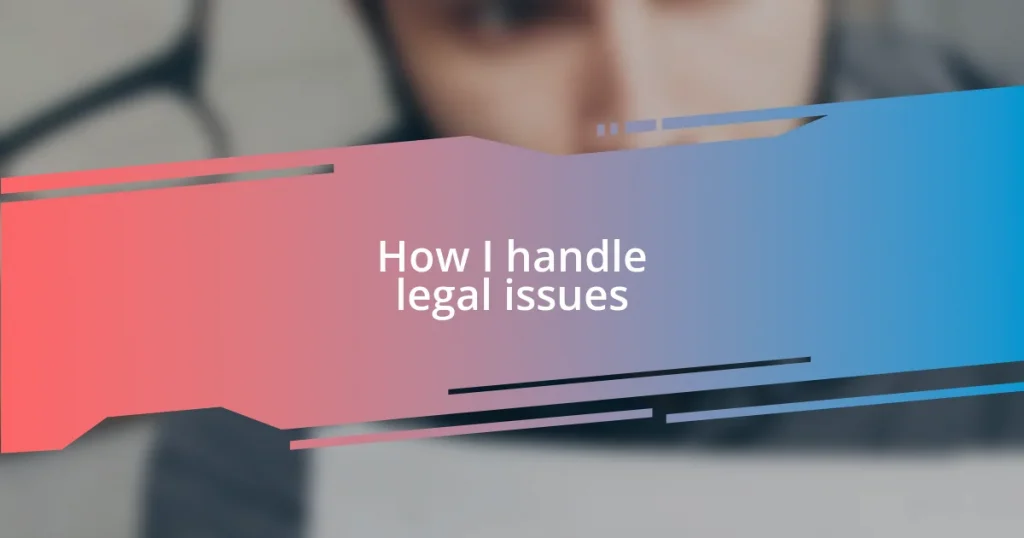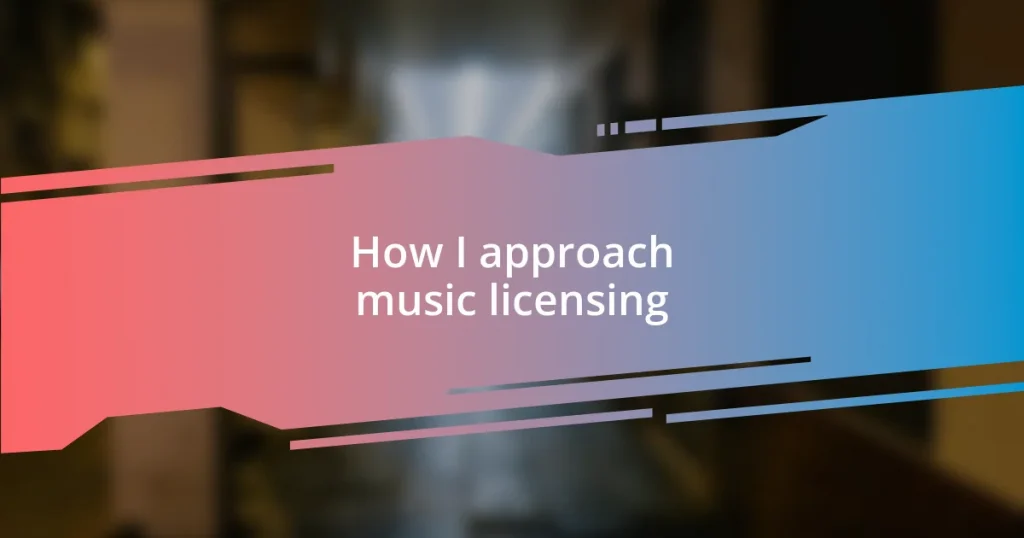Key takeaways:
- Breaking down legal jargon into everyday language helps in understanding complex legal issues and making informed decisions.
- Documenting all relevant information systematically is crucial for building a strong case and empowering oneself during legal discussions.
- Engaging actively and preparing thoroughly for legal consultations and court proceedings fosters effective collaboration with attorneys, leading to better outcomes.
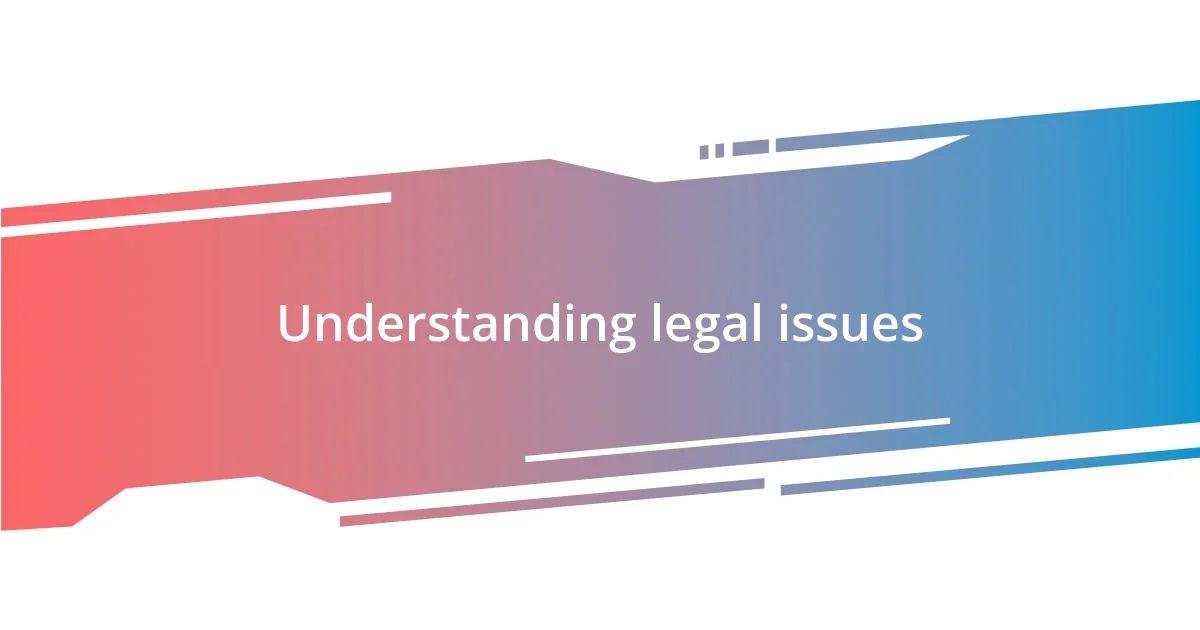
Understanding legal issues
Understanding legal issues can feel overwhelming, especially when you’re faced with unexpected challenges. I remember when I first navigated a contract dispute; I felt lost in a sea of jargon and procedural rules. It made me question, “What do all these terms really mean?”
While legal language can be daunting, breaking it down into simpler terms is crucial. I find that trying to relate it to everyday experiences often helps. For instance, think of a lease agreement like a relationship; it has boundaries and expectations that need clear communication to work smoothly.
Emotions often run high when tackling legal matters, leading to decisions clouded by stress. I learned the hard way that taking a step back to process everything can reveal insights I originally overlooked. Have you ever felt that sudden clarity after stepping away from a heated situation? That’s the moment when potential solutions can start to unfold.
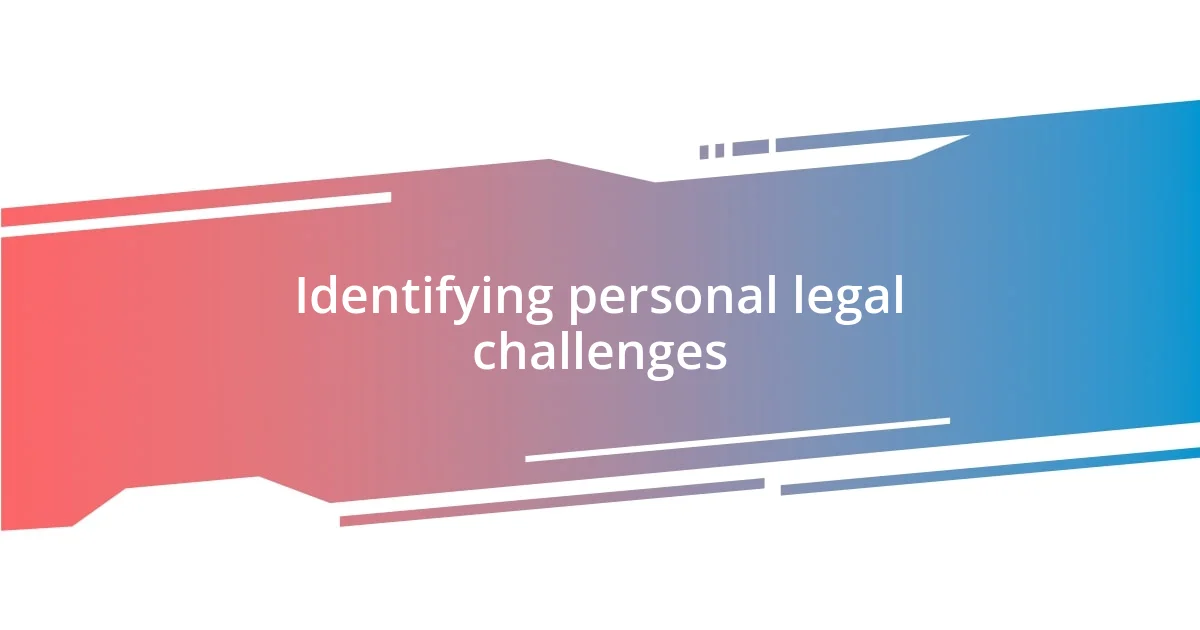
Identifying personal legal challenges
Identifying personal legal challenges often begins with a moment of self-reflection. I recall a time when a neighbor’s fence dispute caught me off guard; suddenly, I found myself unsure about property lines and rights. It struck me how easily a seemingly simple issue could escalate into something complex if not addressed properly. Have you ever faced a similar situation that made you really think about your legal standing?
Sometimes, identifying the type of legal challenge I’m facing involves assessing the context of my life. For example, a family matter, like custody agreements, felt particularly daunting because of the emotional weight it carried. I realized that it was not just about the law but about the impact it had on my family dynamics and emotional wellbeing. Recognizing how a legal issue intertwines with personal feelings can be just as important as knowing the legal facts.
In practical terms, I find it helpful to categorize potential challenges into areas like personal, family, work, and finance. This simple technique can clarify my situation. You might ask yourself: “Where does this issue fit in my life?” By answering that, I often gain insights that point me toward the right resources or professional assistance.
| Type of Challenge | Personal Insight |
|---|---|
| Contract Issues | Can feel overwhelming and confusing, often requiring a detailed look at terms. |
| Family Disputes | Carry emotional weight that can complicate the legal situation. |
| Property Disputes | Seem straightforward but can escalate into significant legal dilemmas. |
| Financial Matters | Often impact everyday living, requiring both emotional and logical handling. |
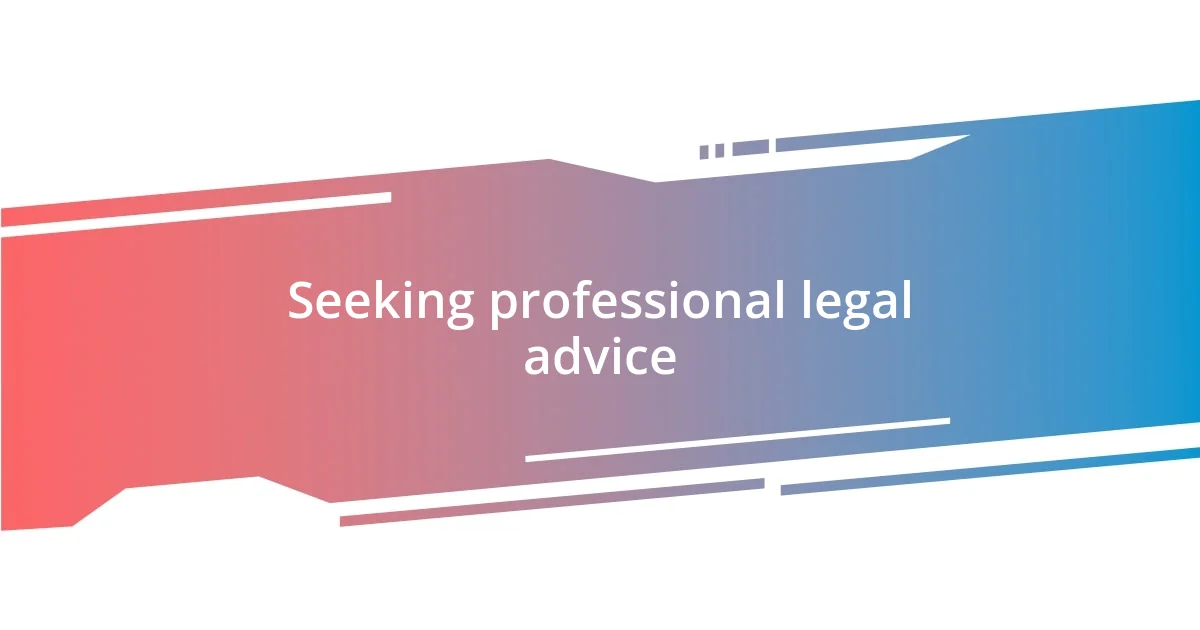
Seeking professional legal advice
Seeking professional legal advice is often the turning point in dealing with legal issues. I remember a time when I hesitated to reach out to a lawyer about a warranty dispute. I thought I could handle it myself, but after countless frustrating hours, I realized that having an expert on my side made a world of difference. Once I connected with the right attorney, the complex legal landscape became navigable, and I felt a wave of relief. It reminded me just how important it is not to underestimate the value of professional help in these situations.
When considering legal advice, there are a few crucial factors to keep in mind:
- Specialization is Key: Different lawyers focus on different areas of law. Find someone who specializes in the area relevant to your issue, whether it’s family law, contract disputes, or criminal defense.
- Establishing Trust: A good attorney should foster open communication and make you feel comfortable discussing your concerns. It’s vital that you feel safe sharing personal details about your situation.
- Cost Transparency: Understand the fee structure upfront. Some lawyers charge hourly, while others may work on contingency; being clear on costs can prevent future misunderstandings.
- Research and Reviews: Look for reviews or personal recommendations to gauge the lawyer’s reputation. I often find that hearing about someone’s experience can help you make an informed choice.
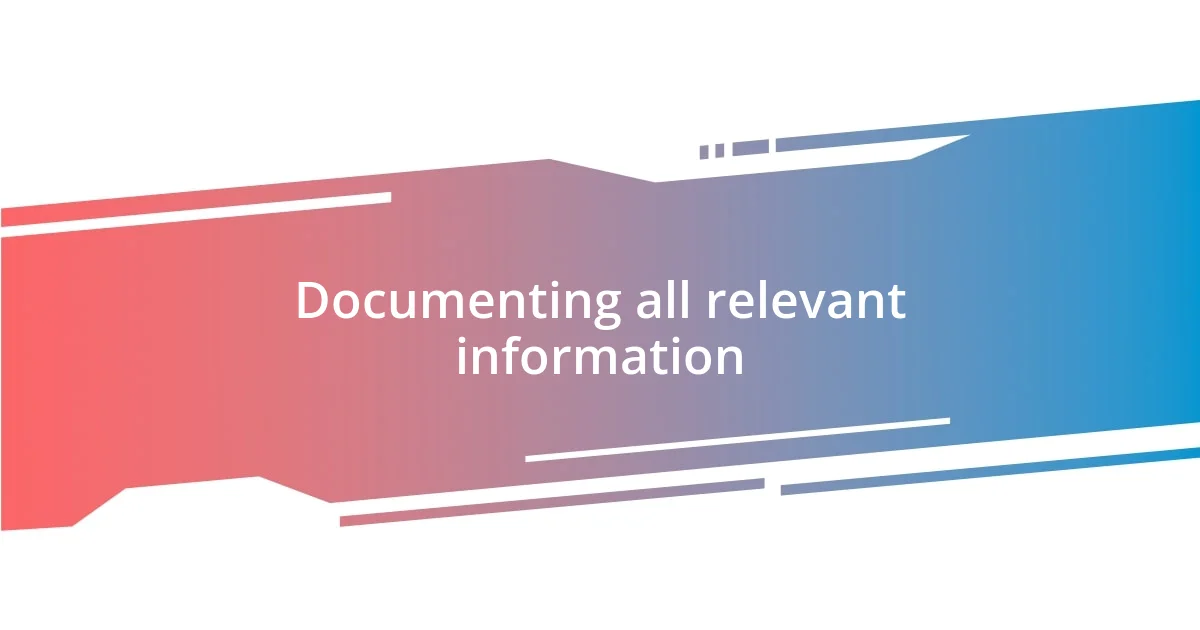
Documenting all relevant information
Documenting all relevant information is crucial when navigating legal issues. I’ve learned the hard way how vital it is to keep detailed records. A few years back, during a lease dispute, I realized I needed every email and text message saved. It wasn’t just about what was said, but when it was said that turned out to be pivotal. Have you ever thought about how timelines can change the narrative?
When I first started documenting my interactions, I often felt overwhelmed. I questioned what information was truly relevant. Then, I adopted a systematic approach, creating a simple spreadsheet to track dates, conversations, and key points. This not only helped me stay organized but also saved me hours of searching for information later on. It was as if I had finally given myself a map in a complex legal maze.
There was a moment when I handed over a detailed log to my lawyer, and I could see the appreciation on their face. It made me realize that such documentation does more than just serve as evidence; it builds a case. I often ponder: what if I hadn’t taken the time to document those exchanges? The clarity it provided made a significant difference in our strategy moving forward, reinforcing my belief that good documentation can genuinely empower you in legal discussions.
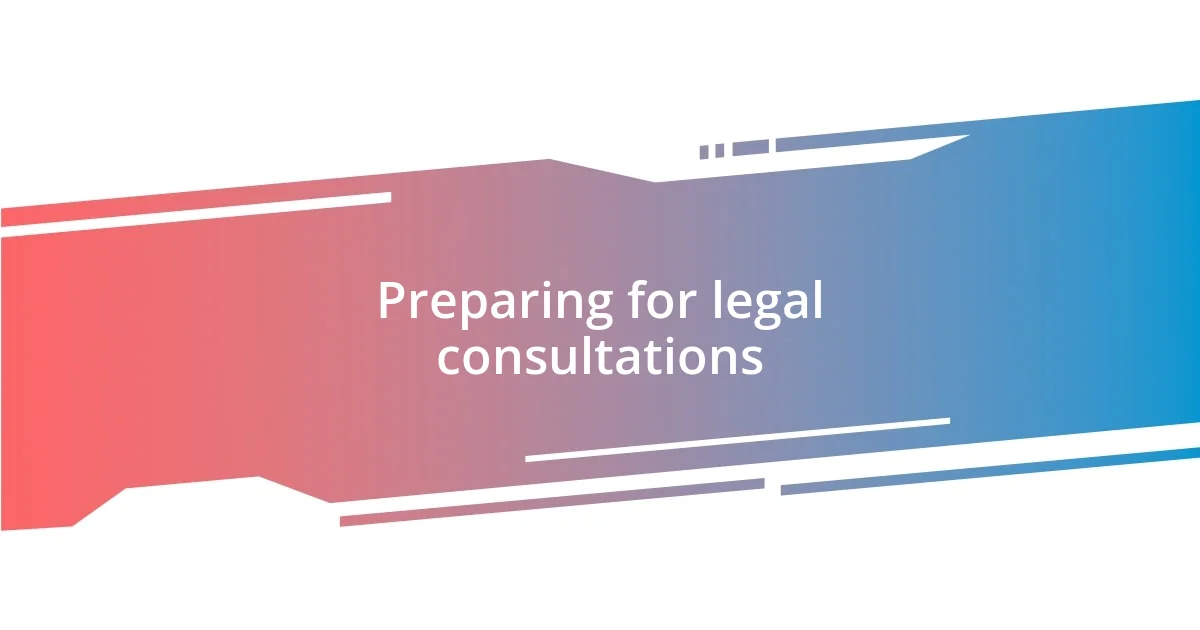
Preparing for legal consultations
Preparing for a legal consultation requires more than just scheduling an appointment; it demands careful thought and preparation. I’ve found that jotting down questions beforehand can provide clarity during discussions. There was a time when I walked into a meeting unprepared and left feeling confused, wishing I had used my time more wisely. Wouldn’t it be frustrating to leave without having addressed your biggest concerns?
Another essential step I’ve implemented is gathering all pertinent documents ahead of time. Once, during a consultation about a contractual issue, I brought a small folder filled with everything related to the case. The attorney’s eyes lit up as we reviewed them together, and I realized how invaluable that preparation was. It not only made our conversation more productive but also helped in painting a clear picture of the situation right from the start.
Also, mindset plays a critical role in how I approach these consultations. I remind myself that this is a collaborative effort; I’m not just a passive participant. I engage actively throughout our discussion, sharing my insights and reacting to advice. Have you ever thought about how much better conversations flow when you’re genuinely involved? This mindset shift not only fosters a stronger connection with my lawyer but also empowers me to take ownership of my legal journey.
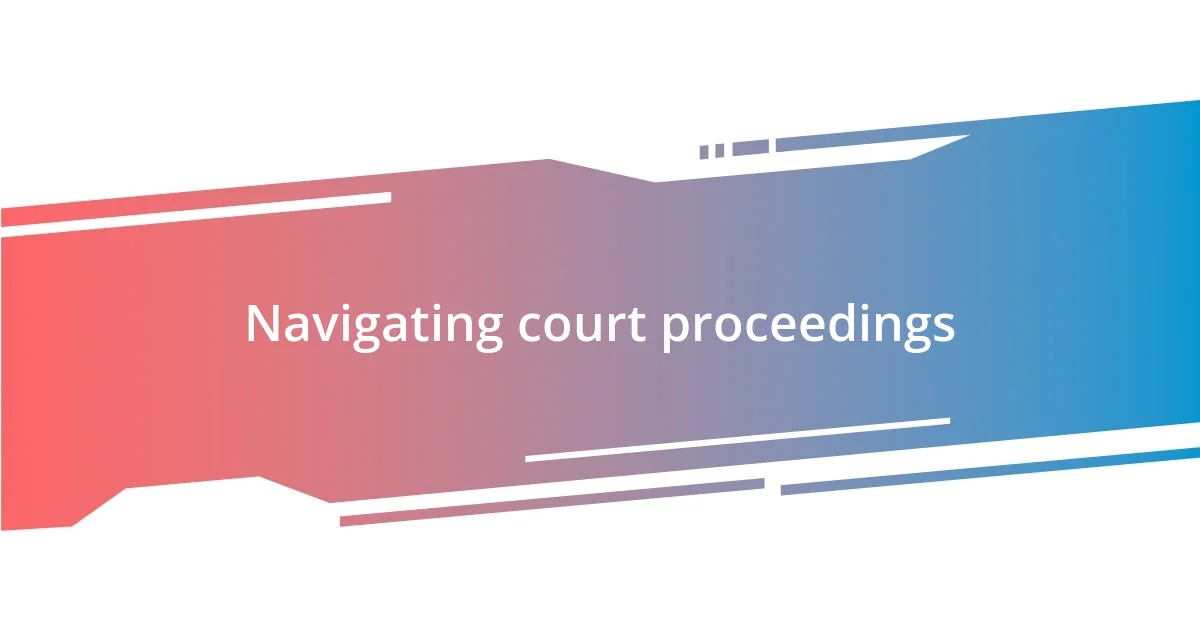
Navigating court proceedings
Navigating court proceedings can feel like an uphill battle, where every step is loaded with uncertainty. I remember the first time I stood in court; my heart raced, and the formality of it all was intimidating. Yet, I discovered that familiarity with procedures made a significant difference. Have you ever noticed how knowing what to expect can ease anxiety? Preparing for each court appearance, I’d review courtroom etiquette, legal jargon, and even what to wear, ensuring I felt confident rather than overwhelmed.
Engaging with the judicial system can be daunting, but I found that building a rapport with my attorney was invaluable. One instance sticks out: as we prepared for a hearing, I made it a point to discuss not just the case but my feelings and fears surrounding it. This honest exchange allowed my lawyer to better represent my interests and convey my perspective to the judge. Have you ever felt the power of personal connection in a high-stakes situation? It transformed our strategy, making me feel heard and less isolated in the process.
Finally, remaining composed during proceedings is crucial. There was a moment in the courtroom that tested my resolve: when the opposing attorney launched into aggressive questioning, my instinct was to panic. Instead, I took a deep breath and reminded myself of my preparation. How often do we underestimate the value of composure under pressure? That brief moment of clarity helped me respond thoughtfully instead of reacting emotionally, proving that staying calm can truly tip the scales in your favor during court proceedings.
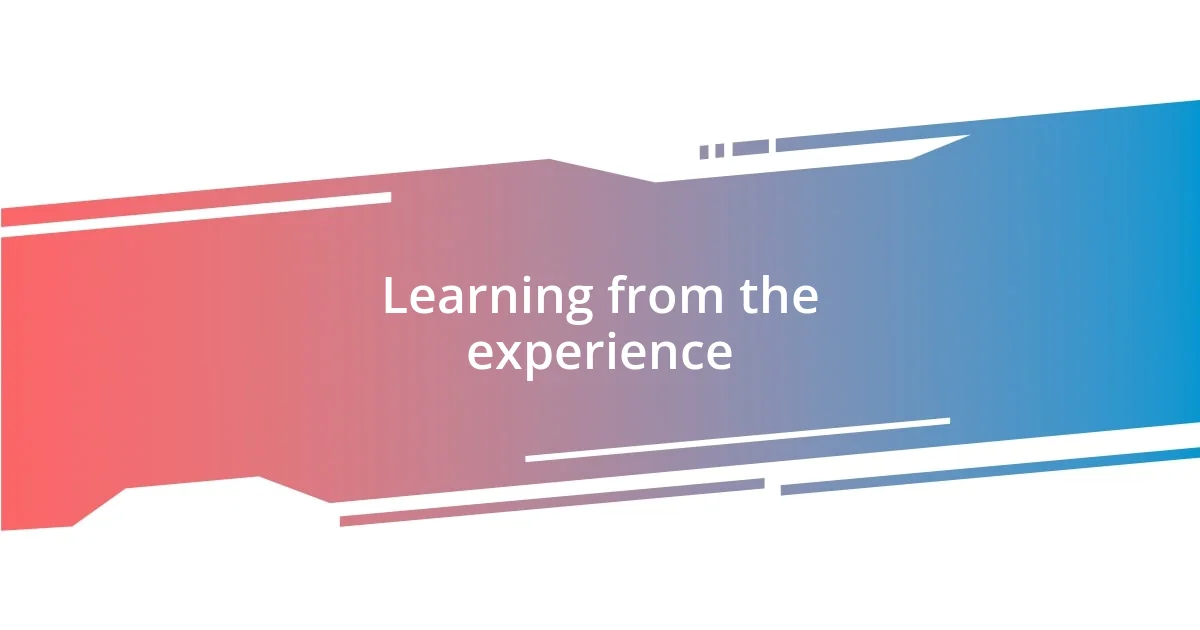
Learning from the experience
Learning from each legal experience has become a cornerstone of my journey. After facing a particularly challenging dispute, I spent time reflecting on what went right and wrong. I realized that analyzing my choices not only illuminated mistakes but also highlighted areas for growth. Have you ever paused to consider how your past choices shape your future decisions?
There was an occasion when I misread a legal document and ended up prolonging a negotiation due to confusion. The frustration was palpable, but in that moment, I learned the importance of thorough reviews. I’ve since adopted a meticulous approach to understanding every detail of legal paperwork, ensuring I don’t repeat that oversight. This experience underscored how each setback can be a stepping stone toward greater competence and confidence.
Beyond specific incidents, I’ve come to value the emotional aspect of navigating legal waters. Each experience left me more resilient; I began to embrace the notion that discomfort can be a catalyst for personal growth. Have you considered how facing challenges can build a more robust version of yourself? Through trial and error, I’ve grown stronger in my ability to handle legal complexities, transforming each stumble into a powerful lesson.










